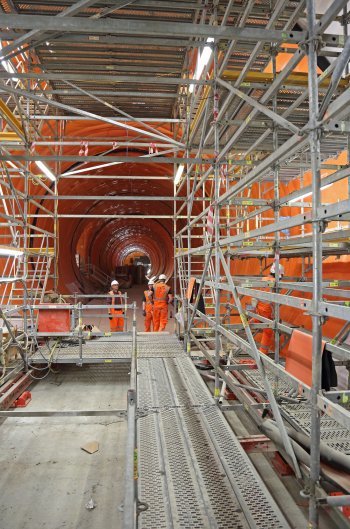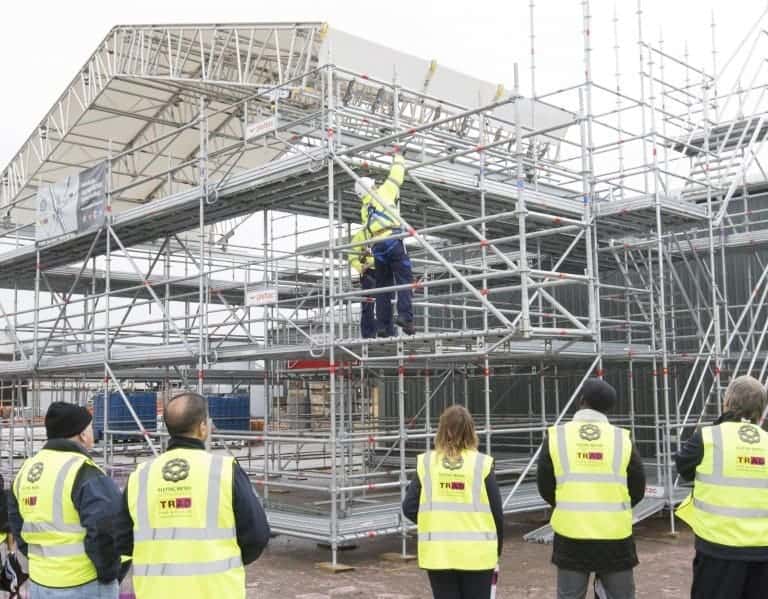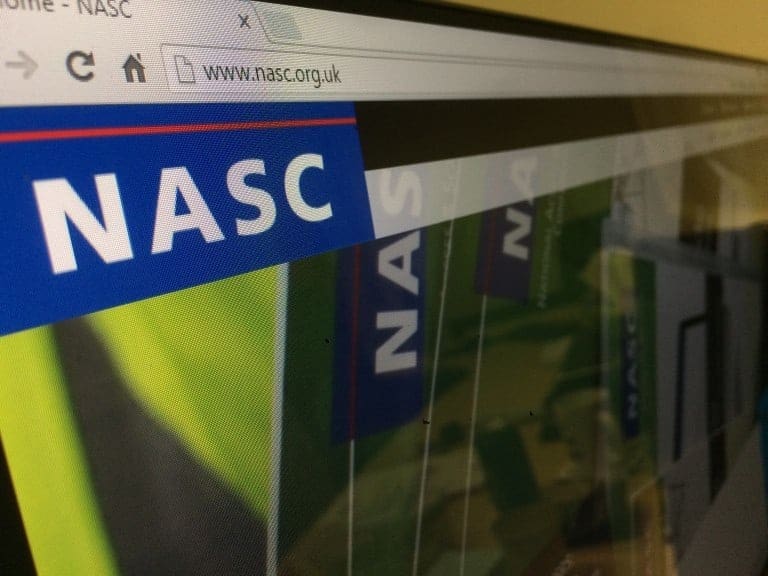The Original Asterix HD Beam
GKR Win the CN Access & Scaffolding Specialist of the Year
GKR Scaffolding Ltd have won the coveted Access and Scaffolding Specialist of the Year award at the Construction News (CN) Specialist Awards 2016
London-based NASC members GKR Scaffolding Ltd have just celebrated 21-years in business and have recently created their own in-house GKR Academy. The academy gives employment training opportunities for scaffolding labourers and operatives to progress to management positions within the firm. GKR have also just celebrated 500,000+ hours without incurring a RIDDOR incident – proving their track record in health and safety. GKR Scaffolding submitted a CN Specialist Awards application in the access and scaffolding specialist contractor category, focusing on their work on iconic London projects, like the complex and high risk, Bloomberg’s new European headquarters, run by principal contractor Sir Robert McAlpine – London’s first billion pound construction job. Speaking about the Bloomberg project, GKR Scaffolding Ltd Director, Lee Rowswell said: “We were appointed early to try and unlock the project and solve workable solutions to the client’s demanding ideas. One of the many challenges was to construct a hoist run-off tower that could be moved at any-time to enable the stone cladding to progress on the external façade of the building. “And as Bloomberg is to be clad in stone and bronze and the bronze is not repairable, GKR made the decision to use a fully tethered system on all scaffolds on the project – giving our client the reassurance that nothing could ever damage the bronze.” Other key GKR Scaffolding Bloomberg project statistics included:- 178,836 Man Hours without RIDDOR or Minor Injury
- 3,836 tonnes of scaffold materials on site
- 1,206 aluminium beams to the base of the scenicliftshafts
- 256 deliveries to site with materials out of hours to avoid congestion within the City of London.
Didcot Power Station Collapse: Major Incident Declared
Update: One person has been killed, three people are missing and five in hospital after a building collapsed at Didcot Power Station.
A major incident has been declared with several casualties after a building collapse at Didcot power station in Oxfordshire, South Central Ambulance Service said. Emergency services are attending a building collapse at Didcot power station in Oxfordshire. Thames Valley police officers are said to be at the scene, along with other emergency services. According to the BBC, three ambulances are said to have also been dispatched, along with a hazardous area response team. The collapse at the Oxfordshire plant was reportedly heard shortly after 4pm. The power station has been listed for demolition but no activity was scheduled for today.Cape awarded new contract in South Korea
Cape plc has secured a contract with Samsung Heavy Industries (“SHI”) in South Korea for the installation of insulation to the Cryogenic Pipework on the Process Topside on Shell’s Prelude Floating Liquefied Natural Gas (“FLNG”) facility.
The Prelude FLNG facility is a global project with the key location for fabrication being in Geoje, South Korea. SHI’s shipyard is where the substructure and topsides are currently under construction and is one of the few dry docks in the world large enough to undertake the fabrication. Once complete, the Prelude FLNG facility will be moored 475 kilometres north-east of Broome in Western Australia. The Prelude FLNG facility is 488m long, 74m wide and along with its contents, will weigh around 600,000 tonnes. It will be the largest floating offshore facility in the world. Commenting on the contract award Joe Oatley, Chief Executive of Cape, said “I am delighted that Cape has been able to secure this contract and that we will be further developing our relationship with Samsung Heavy Industries. Prelude will be the world’s largest FLNG facility and we are proud to be involved with such a prestigious project.”Wood Group wins 5 year contract with Valero Energy
Wood Group has gained 5 year contract with Valero Energy at Pembroke refinery in south west Wales.

Wood Group has secured a new five year framework agreement with Valero Energy, an international manufacturer and marketer of transportation fuels, petrochemical products and power. Effective immediately, Wood Group Industrial Services (WGIS), will provide services to the onshore Pembroke refinery in south west Wales.
The contract signifies an important expansion for the firm into the UK petrochemical sector. WGIS will deliver surface preparation and application of protective coatings under the contract, which has a one year extension option.
Hugh Pelham, managing director of WGIS said: “WGIS has the broad capabilities and experience that positions us well to further extend our expertise into the downstream process and energy market. This is demonstrated by this contract win with Valero Energy, where our focus will be working in partnership with our client to deliver effective and efficient services to enhance the integrity of the asset.”
In 2015, WGIS secured more than $300m of new contracts.
Wood Group is an international energy services company with $6bn sales and operating in more than 50 countries.
TRAD Hire & Sales Ltd receives excellent reviews for METRIX and ALTRIX
Following on from a highly successful open day at their National Training and Product Awareness Centre in Barking, the UK’s leading scaffold supplier showcased their innovative Plettac METRIX Scaffold System, plus the new ALTRIX Temporary Roof System, at another successful open day at their Birmingham depot.
The event started with a live demonstration of these two innovative products – METRIX and ALTRIX – both of which are unique to TRAD Hire & Sales Ltd in the UK, followed by an indoor presentation.
A time lapse video demonstrated just how quickly Plettac METRIX can be erected, evaluating it against other well-known systems and Tube and Fitting. The comparative speed and ease of use of Plettac METRIX conclusively proved the system to be superior in every respect.
It is no coincidence then, that scaffolding industry experts are hailing Plettac Metrix, quoting the system’s versatility, labour saving and programme time reductions as its principal benefits. Further enhancing the system’s advantages is the optional Permanent Advanced Guardrail. Erected from the level below, this component is an innovation in scaffolding safety, which also increases production.
The open day attendees were then introduced to TRAD Hire & Sales newest product, the ALTRIX Temporary Roof System. This all-aluminium weather protection system has been designed to work with any scaffold type, but compliments Plettac METRIX perfectly.
The lightweight colour-coded components are easily identifiable; this along with Push-Fit technology enables quicker assembly times.
The ALTRIX system philosophy is “more than just a roof”; many of the components have been designed with dual roles in mind, meaning they can be used in other scaffolding applications. For example: forming large flush decked areas and bridge sections in independent scaffolds.
A Q&A session followed with Des Moore, TRAD Group Managing Director, covering a wide range of topics, including TRAD’s business model and the commercial benefits that can be gained from using both Plettac METRIX and ALTRIX.
The showcasing of these products gained positive feedback from some of the UK’s leading Scaffold Contractors and Construction Companies, one attendee said:
“We’re currently trialling Plettac METRIX on a Taylor Wimpey site at Nuneaton. We’ve been using it for around three weeks now – it’s brilliant, so fast. Within a couple of days we noticed big time savings.”
Following the success of the open day, TRAD Hire & Sales Ltd has set up a Plettac METRIX and ALTRIX demonstration area at their Birmingham Depot for customers to view the products for themselves. The demonstration area will be a permanent fixture and anyone interested in the products are encouraged to come and experience them first hand.
Book your place today at one of TRAD’s Open Days.
To be one of the first to experience the cost saving benefits of TRAD Hire & Sales’ new products, book your place at one of their upcoming open days – places are limited, so book now on 0161 494 2999 or email [email protected].
Scaffolding firm in court after Scaffolder is Paralysed
Hemel Hempstead Scaffolding Limited has been fined after a worker suffered life changing injuries when he fell from the roof of a barn.

Stewart Thomas from Hemel Hempstead, 31 at the time of the incident, was carrying out scaffolding work in preparation for the installation of solar panels on a barn roof at Gaddesden Home Farm, Bridens Camp on Red Lion Lane on 25 July 2013.
St Albans Crown Court heard that father of one Mr Thomas was placing scaffold boards along the roof ridge when he fell through the fragile roof to the concrete floor eight metres below. He suffered multiple injuries to his head and neck including a brain stem injury, a punctured lung, broken ribs and a lacerated liver. Mr Thomas is now unable to talk, move or feed himself and requires residential care.
A Health and Safety Executive (HSE) investigation found Hemel Hempstead Scaffolding Limited had never provided a written method statement or risk assessment for this work. Critically there were no fall protection measures in place, and there was also no appropriate supervision of inexperienced and trainee scaffolders on the site.
Hemel Hempstead Scaffolding Limited of Seymour Crescent, Hemel Hempstead pleaded guilty to breaching section 2 (1) of the Health and Safety at Work etc Act, 1974 and were fined £110,000 and ordered to pay £22,596 in costs.
After the hearing Stewart’s mother Karen Coffey said: “I have had to move from my home and family in Hemel Hempstead to Northamptonshire to be near Stewart.
“My other children find it very hard to see Stewart the way he is now, but along with my mother I visit every day. I have also taken a job nearby that keeps me close to Stewart but also gives me something else to concentrate on.
“My granddaughters are going to miss out so much on the things they would have done and learnt from Stewart.
“Since my son Stewart’s accident all our lives have been dramatically changed – hopefully we can try and move forward to make Stewart’s life as best we can with his family close by him.”
Speaking after the hearing HSE Inspector Stephen Manley said: “The company’s approach to health and safety was poor. They failed to properly and safely plan the work they were contracted to carry out and failed to supervise inexperienced young workers. The particular works would have been unfamiliar to the team and so the lack of thorough supervision was lamentable.
“As a result of their failings a young father has been left being unable to communicate or look after himself and he will never be able to play with his young daughter.
When working at height, there is a high likelihood of serious injury or death if safe procedures are not put in place and adequate steps taken to ensure they are followed”.
PERI’s scaffolding success at Farringdon Station
PERI Ltd, the UK’s largest manufacturer of scaffolding and formwork, has provided significant time savings thanks to its unique scaffolding solution for the tunnel works on the Farringdon Station Crossrail project.
One of the most significant infrastructure projects to ever be undertaken in the UK, construction work on London’s ambitious Crossrail operation is 70% complete. Set to provide a quicker and more direct travel route across the capital, the new railway will be a high frequency, high capacity service linking 40 stations via 21km of new twin-bore tunnels under central London and the Docklands.

To construct the tunnels at Farringdon Station, mobile scaffolding with a diameter of more than 8m was required to enable both waterproofing and spray concrete lining. Additionally, the scaffolding design required access for trucks to enter the tunnel so concrete work could run simultaneously.
One of the challenges for PERI was to meet Prestec’s preference for a castor-mounted scaffolding structure, which significantly restricted the weight available for PERI and the contractor to work with. Also, the requirement for the scaffolding to enable concrete spray lining meant the structure would be too wide for movement along the tunnel.
PERI’s design team in Brentwood were able to tailor the PERI UP system so it could fit detachable cantilevered console brackets on the edges of the structure to allow waterproofing construction to take place. Once waterproofing was completed, the brackets could also be utilised for the concrete spraying, which enabled the work to be completed in a shorter period of time for the client.
Another major challenge for PERI’s design team was to incorporate the requirement for truck access. With safety and stability at the forefront of any construction project, PERI had to ensure that its scaffolding structure was meticulously designed to ensure worker safety, while also ensuring that it could be supported on the castors. The scaffolding was therefore designed with a passageway through the middle of the structure, which was a UK-first for PERI. The 4.4m high x 3m wide opening enabled the trucks to pass through without disrupting the waterproofing works.
Following the success of the PERI UP system on the castors, BFK extended the partnership with PERI to help completion of another section of the tunnel. For this section, BFK required the same system but in different sizes meaning PERI had to adapt the existing system to work on heavy-duty rollers. A combination of PERI’s Rail Climbing System (RCS) and VARIOKIT was utilised to allow an adjustable scaffolding system for the tunnelling.
Guillermo Lalinde, Section Engineer at BFK, commented: “The new system from PERI let us increase the width of the working platforms at different levels as weight was no longer a limiting factor. This reduced the time required to move the tower forward from one hour to 20 minutes, leading to an increase in production from five linear metres of tunnel per day to 12 linear metres.”
Neil Butlin, sales engineer at PERI Ltd, said: “Being involved with the Crossrail project posed significant challenges for PERI and we are delighted with the ongoing results. Introducing safe access stretching the whole circumference of the tunnel meant we had to design the PERI UP system in a way that has never been used before in the UK. The feedback from BFK has been great and we look forward to continuing this relationship on the Crossrail project.”
PERI’s involvement with the project will continue as they are now designing a system for construction of the escalator shafts. The new design will again use the combination of RCS, PERI UP and heavy-duty rollers but this time will see the system climb up the shafts. The construction work on the escalators is set to commence in February 2016 with the station’s final completion due in 2018.
Radical New Look Website For The NASC
After six months work the NASC goes live with a fresh new-look website.
The new website – www.nasc.org.uk – offers a radical new look, modern desktop and mobile optimised functionality, user-friendly online shop, integrated social media and news feeds, and is jam-packed full of scaffolding and access information. The large scale website re-development project – which has been ongoing for six months and has been managed by NASC’s Membership and Communications Manager, Jamie McGuire – has been steered by London-based website development and creative agency, Deep. Their team of website developers, designers and coders were charged by NASC with ‘simplifying the user experience, engaging users with diverse, accessible content, maximising the impact of the NASC’s busy social media platforms, driving traffic to a re-vamped online store and creating a new-look, engaging, high functionality and mobile optimised website, to suit modern user habits.’ The new website features simplified and enhanced access to the NASC online shop – with clearly labelled member and non-member pricing structures for the NASC’s Safety and Technical guidance, and colour coded navigation. There is also separate, easy to find expanded sections for core technical and safety guidance (TG & SG), like TG20:13 (‘Good Practice Guidance for Tube and Fitting Scaffolding’) and SG4:15 (‘Preventing Falls in Scaffolding Operations.’) In addition, there is a whole new membership section – to reflect the current NASC President, Alan Lilley’s desire to boost SME’s to join the organisation. And the site also includes a fully-loaded member’s area – with access for Full, Non-Contracting and Information Only members. Further information sections have been added to the new site, offering quick access to the NASC’s Product Code of Practice, NASC Yearbook, Annual Safety Reports, video guidance, media libraries, FAQs, useful links and scaffolding training sections. And the menu systems – on both desktop and mobile (phone and tablet) versions – are simple and easy to navigate, with a large, moving home page slider offering quick links to key areas. The new website also now hosts a news and social media hub – accessed primarily from the home page, but also via the simple header and footer menus – allowing users to keep up to speed with the latest NASC updates, with a busy news section and constantly-updated social media platform. NASC MD, Robin James said: “It’s important to make sure we move with the times as the national trade body for access and scaffolding in the UK – so that industry-leading safety and technical guidance is as accessible and visible as possible. “Undertaking a full re-build of the website and online shop is no small task and we’d like to thank the agency, Deep for their hard work in creating something special and accurate to the brief. We are confident that members, non-members, the media, the construction industry and the public will benefit from the new website.” NASC Marketing Manager, Phil Royle said: “The driving force of the project was to modernise the out-going website, make the online shop more visible and user-friendly, carry across a wealth of important safety and technical guidance and create more brand awareness – assisting in our mission to encourage membership sign-ups and the continued growth of the organisation. “We are thrilled with the result. The new website better reflects our brand values and position within the construction industry, whilst offering users a richer, simpler and mobile-optimised user experience – perfect for the times we live in. It’s loaded with great content, industry news, up to date scaffolding guidance and vibrant social media. We’d encourage everyone to check it out.”CISRS Supervisors & Managers Refresher Course Launches
CISRS have announced that From the 1st March 2016 anyone wishing to renew their CISRS Supervisors / Manager card will be required to complete the newly developed refresher/CPD course.
The course has been developed for CISRS by Rick Statham Managing Director of Safety and Access Ltd. Following the recent successful completion of a Pilot course which was attended by scaffolding Supervisors from IBN Scaffold Access Ltd (Barnsley), High Peak Scaffolding Ltd (Buxton), CISRS Lead Instructors Tony Barry (NCC Midlands), Stuart Hemmings (WATA), Rob Nichols (Safety and Access) plus CISRS Scheme Manager Dave Mosley, all of whom are due to renew their CISRS Supervisor/Managers cards in 2016. Rick Statham (Safety and Access) said: “There was a really good mix of delegates attending the pilot course which made for some interesting debate and produced some suggested tweaks to the course content which have since been incorporated.”
The introduction of the refresher/CPD course for Supervisors which is in addition to the work carried out by the CISRS Standardisation working party is the first step in an initiative to introduce this type of programme for the whole of the CISRS scheme. Both HSE and the wider industry are great supporters of CISRS but had requested that they gave consideration to CPD which would reflect what a lot of other industry recognised qualifications require.
The programme would be two days in duration and will cover the following areas:
Health & Safety
Legal Overview – Health & Safety Law
Health and Safety Management
HSE ACOPs and Guidance
Performance Standards
British and European Standards
NASC Safety and Technical Guidance
TG20:13 & SG4:15 appreciation
Asbestos Awareness
Supervisory Skills
Planning and Organisation
Materials and Logistics
Competence and Allocation of Duties
Effective Supervision
Statutory Scaffold Inspections and Inspection Practices
Behavioural Safety overview
Effective Communication (including basic presentation skills, briefings and Toolbox talks)
Risk Assessment & Method Statement
Delegates are required to complete RAMS for several case studies.
Delegates will be required to successfully complete a written test, several case study projects, and deliver a toolbox talk all of which will contribute to their overall pass/fail assessment criteria.
CISRS Scheme Manager, Dave Mosley (CISRS) said: “CISRS Supervisor/Manager’s cards are recognised by Build UK and the wider industry, however Site Supervisor Safety Training Scheme (SSSTS) and Site Manager Safety Training Scheme (SMSTS) courses are often favoured by clients when requesting Supervisory training for those working on their sites. CISRS feel that as their course covers all the generic topics covered in the the SSSTS/SMSTS courses but is delivered with a trade specific slant that CISRS courses have more value and relevance to those working in the scaffolding sector. We are currently considering allowing those working full time within the sector who already hold SSSTS or SMSTS the opportunity of attending the new CISRS Supervisor/Manager CPD course and making them eligible to apply for a CISRS Supervisor card.”
Course materials will be passed onto to the approved providers imminently in order to be ready for the 1st March launch date.
For further details about the Scaffolding Supervisor Refresher course, other CISRS card courses, training changes following the introduction of TG20:13 and SG4:15, information and dates on courses available, a list of approved training providers, or to find out more about CISRS, please visit www.cisrs.org.uk or email [email protected].
Rick Statham (Safety and Access) said: “There was a really good mix of delegates attending the pilot course which made for some interesting debate and produced some suggested tweaks to the course content which have since been incorporated.”
The introduction of the refresher/CPD course for Supervisors which is in addition to the work carried out by the CISRS Standardisation working party is the first step in an initiative to introduce this type of programme for the whole of the CISRS scheme. Both HSE and the wider industry are great supporters of CISRS but had requested that they gave consideration to CPD which would reflect what a lot of other industry recognised qualifications require.
The programme would be two days in duration and will cover the following areas:
Health & Safety
Legal Overview – Health & Safety Law
Health and Safety Management
HSE ACOPs and Guidance
Performance Standards
British and European Standards
NASC Safety and Technical Guidance
TG20:13 & SG4:15 appreciation
Asbestos Awareness
Supervisory Skills
Planning and Organisation
Materials and Logistics
Competence and Allocation of Duties
Effective Supervision
Statutory Scaffold Inspections and Inspection Practices
Behavioural Safety overview
Effective Communication (including basic presentation skills, briefings and Toolbox talks)
Risk Assessment & Method Statement
Delegates are required to complete RAMS for several case studies.
Delegates will be required to successfully complete a written test, several case study projects, and deliver a toolbox talk all of which will contribute to their overall pass/fail assessment criteria.
CISRS Scheme Manager, Dave Mosley (CISRS) said: “CISRS Supervisor/Manager’s cards are recognised by Build UK and the wider industry, however Site Supervisor Safety Training Scheme (SSSTS) and Site Manager Safety Training Scheme (SMSTS) courses are often favoured by clients when requesting Supervisory training for those working on their sites. CISRS feel that as their course covers all the generic topics covered in the the SSSTS/SMSTS courses but is delivered with a trade specific slant that CISRS courses have more value and relevance to those working in the scaffolding sector. We are currently considering allowing those working full time within the sector who already hold SSSTS or SMSTS the opportunity of attending the new CISRS Supervisor/Manager CPD course and making them eligible to apply for a CISRS Supervisor card.”
Course materials will be passed onto to the approved providers imminently in order to be ready for the 1st March launch date.
For further details about the Scaffolding Supervisor Refresher course, other CISRS card courses, training changes following the introduction of TG20:13 and SG4:15, information and dates on courses available, a list of approved training providers, or to find out more about CISRS, please visit www.cisrs.org.uk or email [email protected]. 









